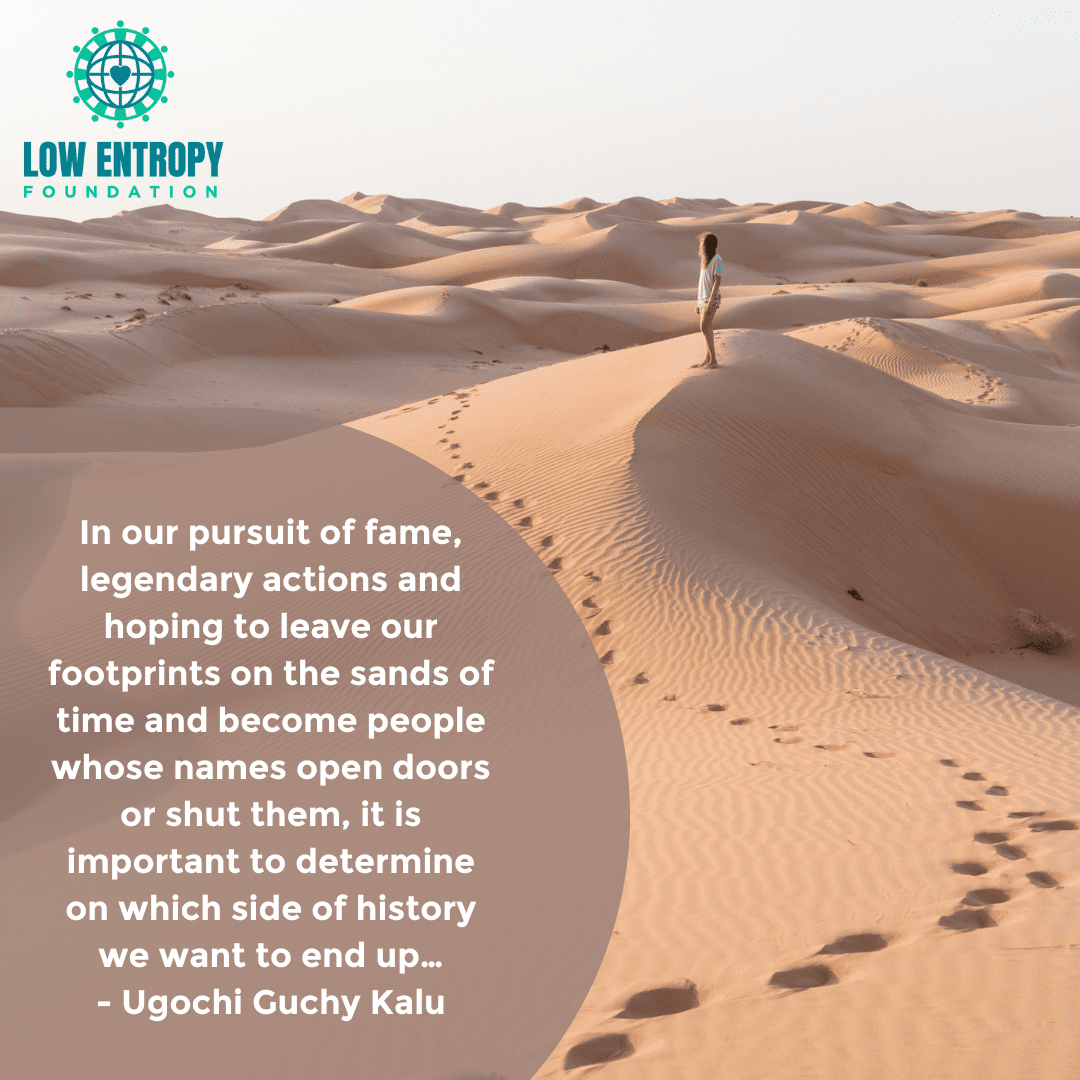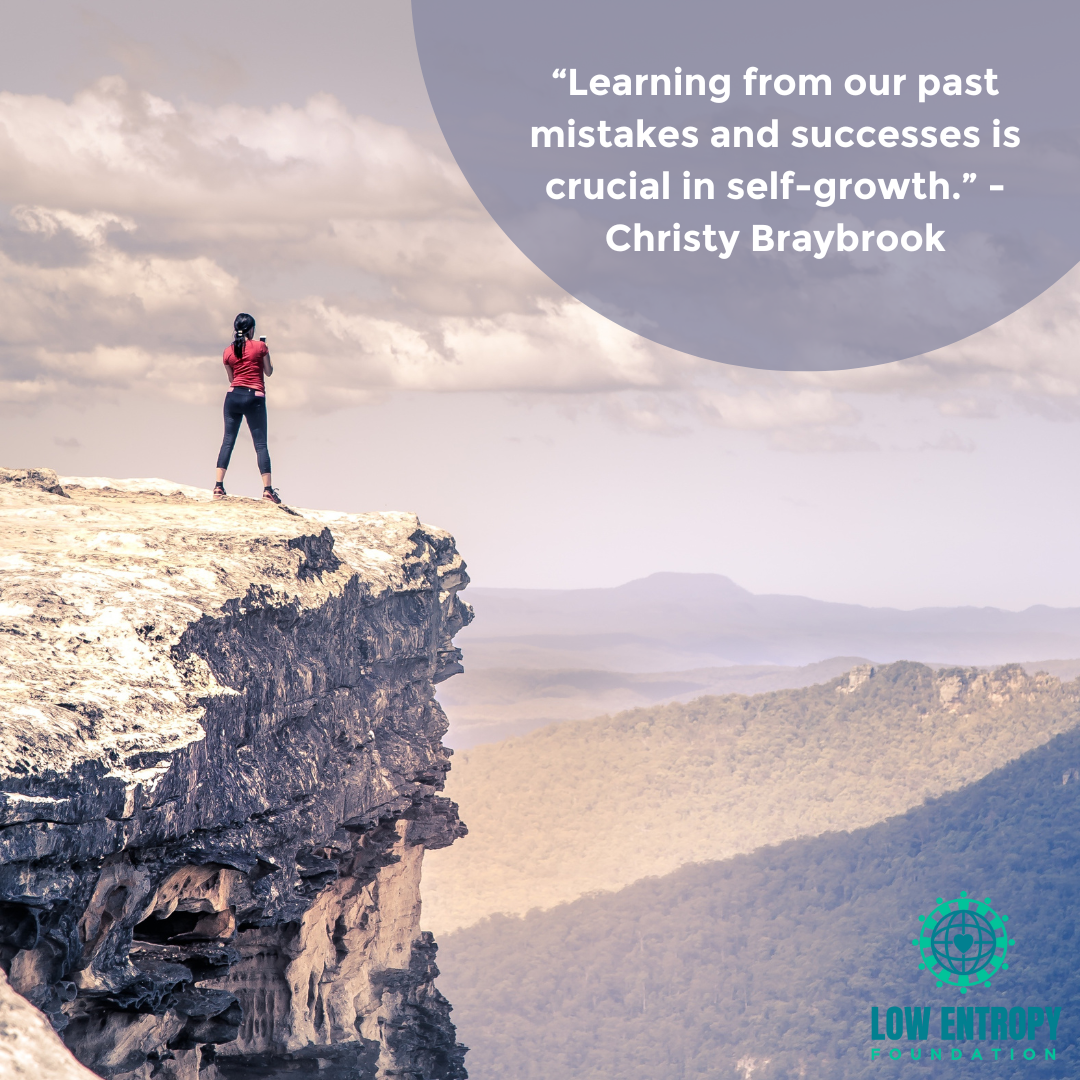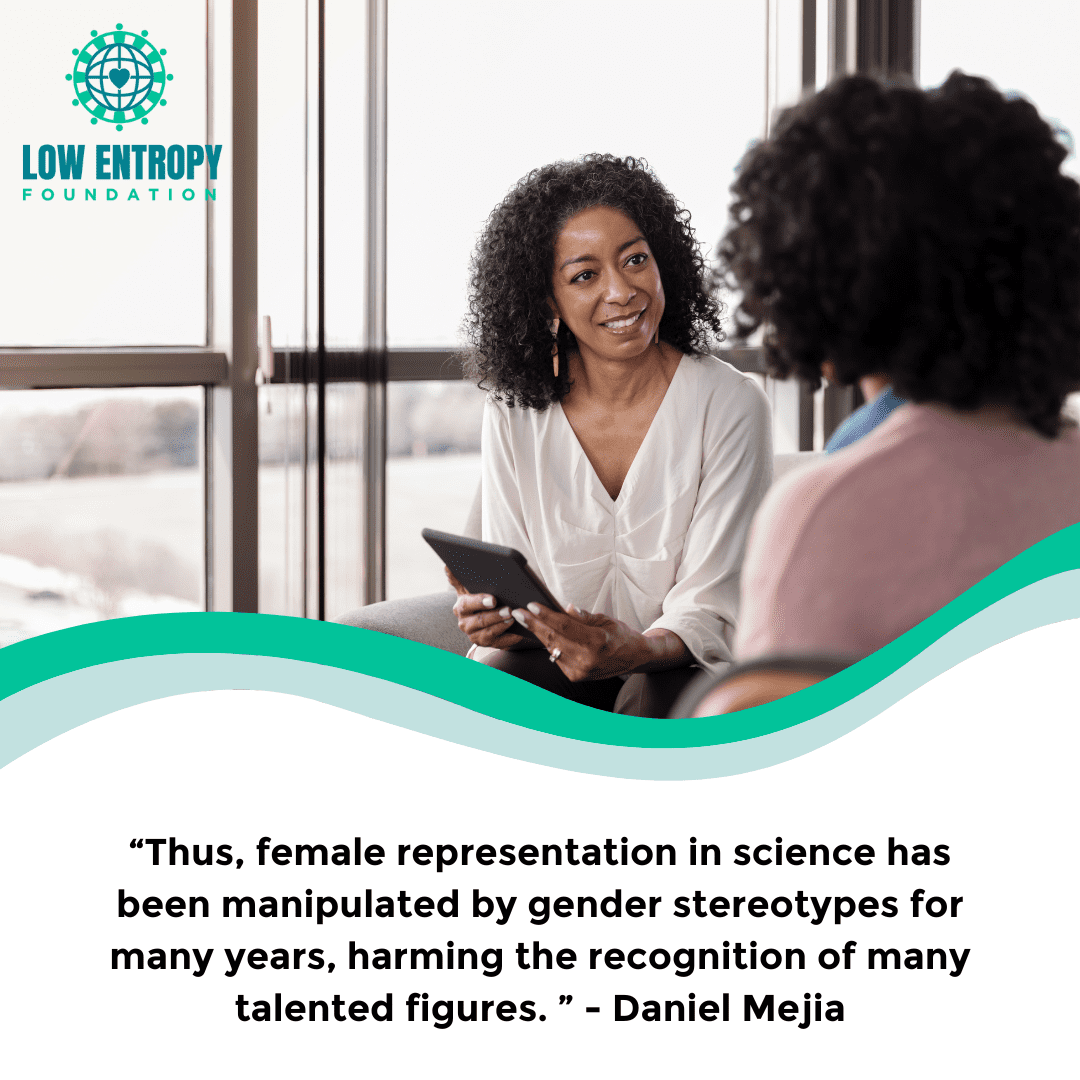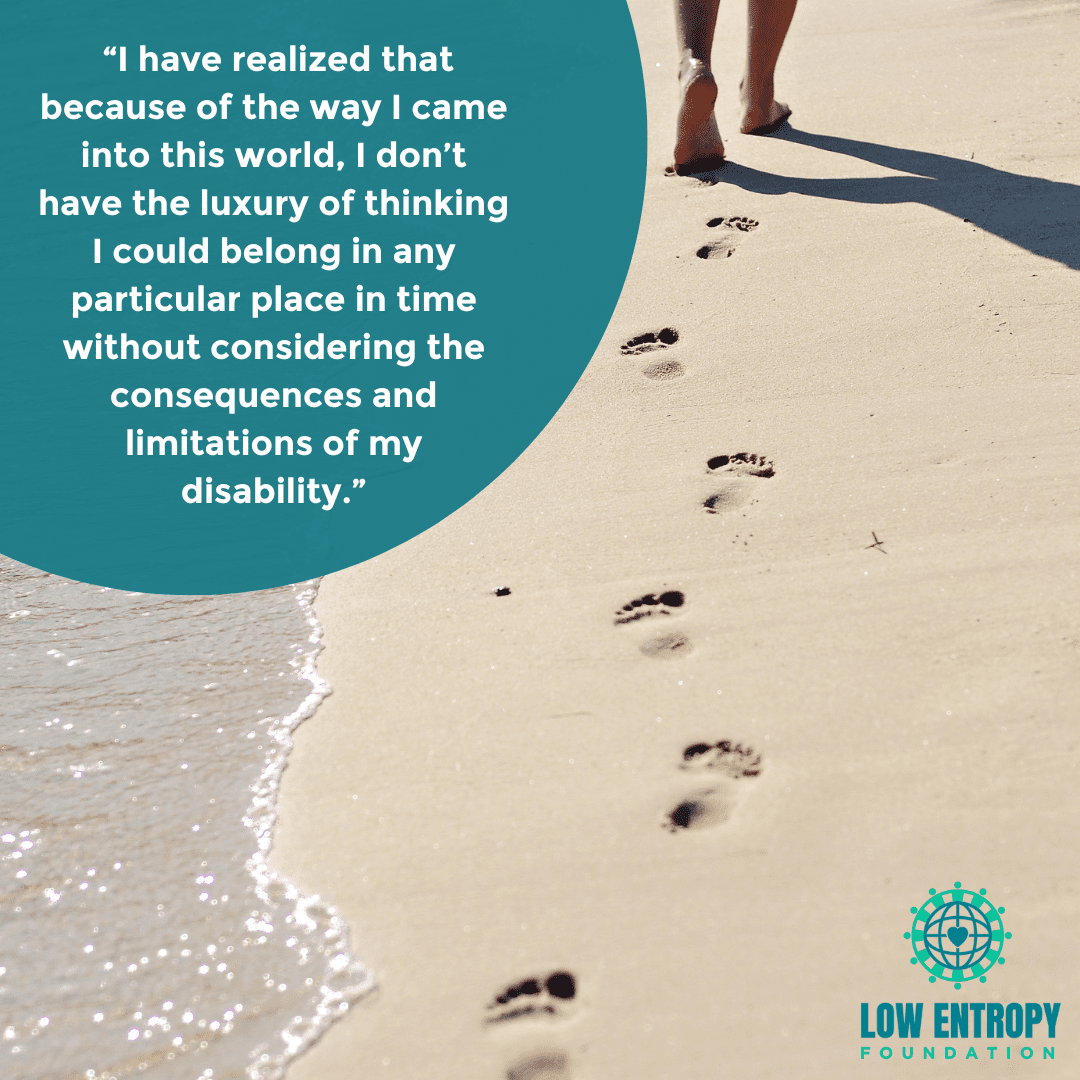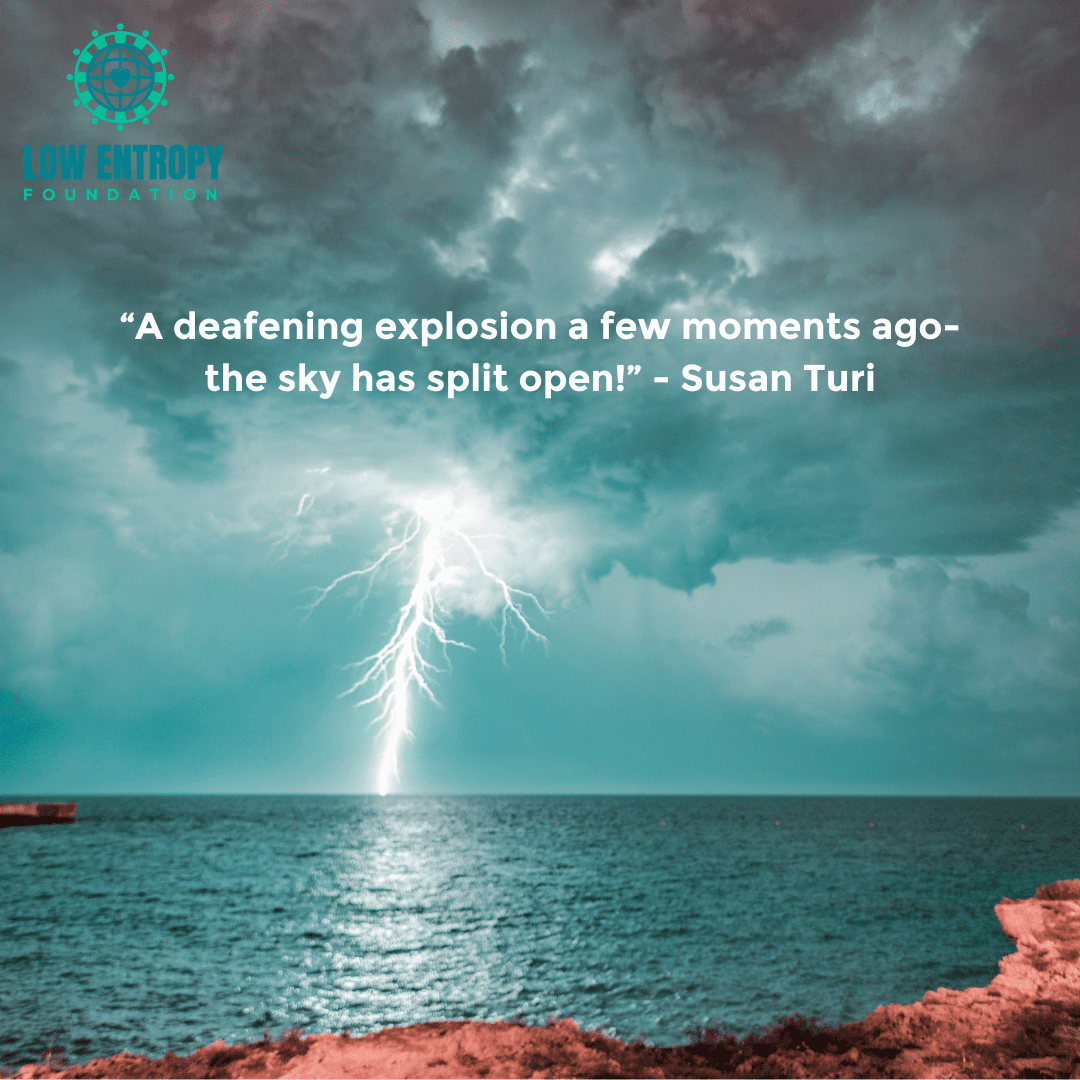Ugochi Guchy Kalu (she/her/hers), Low Entropy Volunteer Writer
Arizona and I have been friends for over ten years. All the while, I assumed she was named for the state of Arizona until recently when she told me she was named for the battleship USS Arizona that capsized when her grandfather served as a marine chef. Her grandfather single-handedly rescued about 20 soldiers before the ship finally sank. She was named in honor of her grandfather’s bravery and selfless human act and till this day, an image of her grandfather is being saluted at the marine corps base of the state of Arizona. As fascinating and mind-blowing as this story was, I couldn’t help but wonder if he planned on being famous all his life or just stumbled on the chance to write his name in the history of his state. It must have been an ordinary day and one act changed the cause of his life and made his name legendary.
Anyone whose reputation precedes them, who lived in the past and whose deeds exerted a significant impact on other people’s lives and consciousness is well considered a historic person. There are positive and negative historic people, now whether or not these people have the premeditation of putting themselves on the side of history they ended up on is yet to be read from their autobiography or personal task lists. From time immemorial, many heroes have risen, impacted, and made inventions that were extraordinary and continue to thrive in human history. These inventions continue to evolve so that their purposes are still relevant in today’s society. As William Shakespeare rightly said, “[s]ome are born great, some achieve greatness, and some have greatness thrust upon them.” In order to become historic, either of these pathways can lead you easily into the book of times.
Let’s take a little memory trip to the people whose inventions, actions and inactions brought great light to the society of their time and have continued to live on many years after they are gone. People like Thomas Edison, Graham Bell, Henry Ford, Johannes Gutenberg, Leonardo da Vinci, Benjamin Franklin, Thomas Jefferson, Nikola Tesla, Madam C. J. Walker, the Wright brothers, Ann Tsukamoto, etc. All these great people invented technologies that have continued to be relevant to the development of the world today. These people were going about their business, diligently working on projects they were passionate about without knowing how much change their work would bring to the entire world. Today we drive cars, fly airplanes, print on paper, use light bulbs, and have access to stem cell technology courtesy of these great people who had dreams, worked hard and ended up on the right side of history.
There are also people who consciously rose up to make changes, stop oppression, called for amendments to be made, demanded good governance and got prosecuted for seeking justice. These are historical people who were forerunners and abolitionists. Let’s consider Nelson Mandela of South Africa who rose up to fight against apartheid, genocide and selective racism. He was fighting for freedom and ended up becoming the first Black president who unified the many races in South Africa where freedom and equality is now a basic right for every citizen. Martin Luther King Jr was known as the king of civil disobedience who used his voice to change minds, fight racism in his effort to unify the human race. He ended up in history and he was even more celebrated when President Obama ascended to the revered seat of the United States of America as the first Black president. There are abolitionist like Mary Slessor who stopped the illegal killing of twins, Frederick Douglas who stopped Black slavery, Lucretia Mott, who was the pionneer reformer for women’s rights. These are people who ended up in history by being the first to accomplish certain things that were considered mundane or gender specific.
Consider people like Ferdinand Magellan who was credited with masterminding the first expedition to circumnavigate the world, Neil Armstrong who was the first human to walk on the moon, Sputnik 1 being the first from the Soviet union to launch into space, Amelia Earhart who was the first woman to fly an airplane, Marie Sklododowska who was the first woman to win two Nobel prizes for discovering uranium and polonium while studying chemistry, and Bertha Von Suttner who was the first to receive the Nobel Peace Prize for being a leading figure in a nascent pacifist movement in Europe. These people were following their dreams, being humane, being brave in their pursuit while ending up in history years later. It is also true that while people hope to be famous, enjoy being famous, there is no set time or steps to take in becoming a historical person; only records of acts, achievements, involvements can guarantee that.
The world has seen tragedy in many forms. Wars, genocides, riots, killings, famine, etc. The real evil, however, lies within the architects of these inhumane practices: men who advocated for crimes to a level no one else could fathom. Their decisions wreaked havoc on humanity and all that comes with it. The one person at the fore would be Adolf Hitler, the Nazi white supremacist who was responsible for the Holocaust and World War II. Vlad the Impaler, who reigned terror on the people of wallachia by roasting children and feeding them to their mothers, Pol Pot, the only Cambodian ruler who ordered a genocide on his own people between the years 1976 and 1979, killing 25% of his country’s population, Heinrich Himmler, who ordered the extermination of all Jews in Europe during World War II, Saddam Hussein, who killed about two million people between 1937 and 2006, Idi Amin of Uganda who was a known cannibal, mutilated his wives and fed millions of humans to his pet crocodiles and sharks, Leopold the 2nd of Belgium, who killed ten million Congolese by starvation in order to gain money and fame, Mao Zedong of China, who killed about 40 to 70 million people though forced labour, executions and starvation in his efforts to mordenize China, Osama Bin Laden, Attila the Hun, Talat Pasha and many others whose actions have left nothing but blood in the pages of history, not forgetting the Catholic priest George Zabelka who blessed the atomic bombs on Hiroshima and Nagasaki.
In our pursuit of fame, legendary actions and hoping to leave our footprints on the sands of time and become people whose names open doors or shut them, it is important to determine on which side of history we want to end up. Knowing that no one particularly wakes up to become historic, neither is there a set rule to becoming historic. However, our actions, inaction, pursuits, crusades, belief systems could just be the one thing that lands us on the pages of history or grants us a statue at the national museum of the people. If achieving recognition for your works is your goal, I would strongly recommend studying the lives of the great men and women who have done so in the past. Anyone who has “the Great Honorable”, “the Ambitious”, “the Diligent”, “the Strong”, “the Inquisitive”, “the Tenacious”, “the Adaptable”, “the Intelligent”, or “the Wise” written before their names would be a great person to study in order to become historic.
My late great grand uncle Chief Kalu Mbonu was the first to receive the English colonizers into my village, he welcomed them and stopped the attack the villagers launched on them. He learned the English language and was open to a relationship. The colonists built schools, churches and hospitals and paved the way for some of the village’s industrious sons to travel out and engage in commercial activities which in turn brought many developments. My village is now known as “small London” as a result of having similar structures and architectural designs found in the United Kingdom. I never met him, but his statue was molded at the center of my community and till today his story is being shared to anyone who asks. He became a historic figure by being cautious and encouraging others to embrace the changes that had invaded them rather than fight it. Many would have been killed if they tried fighting colonization, but he saved lives by the choice he made and the influence he exerted. While he didn’t set out to be famous or act in a way that served a selfish purpose, his legacy continues to be positive because of his decision.
–
My Name is Ugochi Guchy Kalu, I am a strong advocate of civil society and good governance. While we go about our daily lives, let’s be mindful of our actions and decisions as we might one day end up in history pages. See you at the top!







